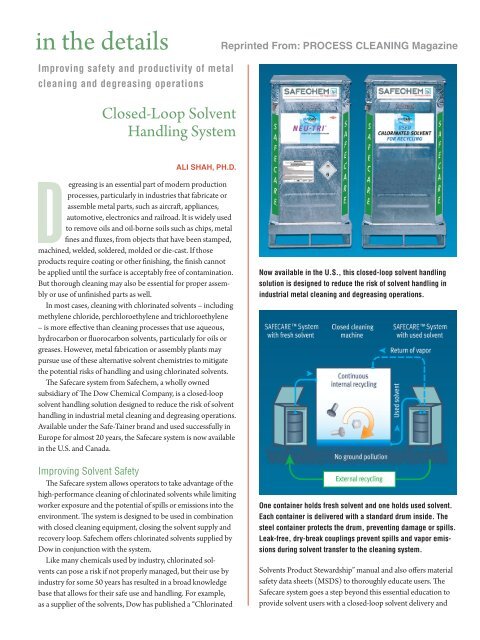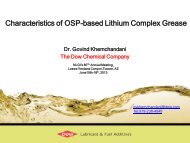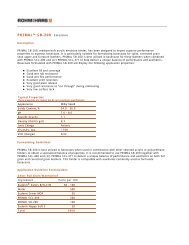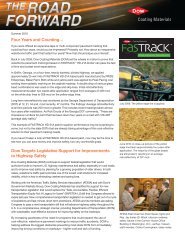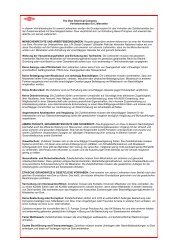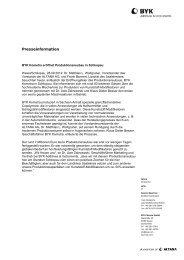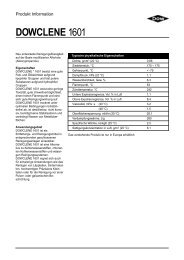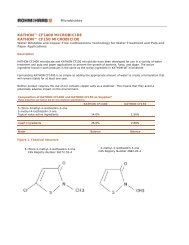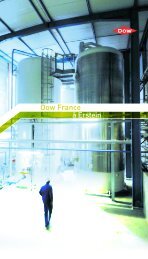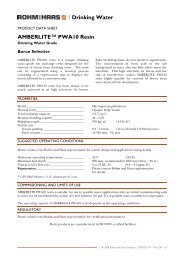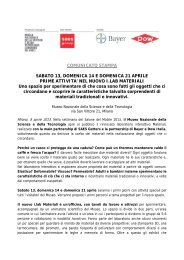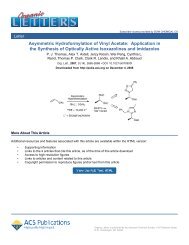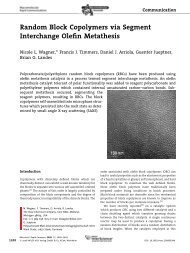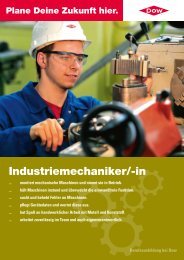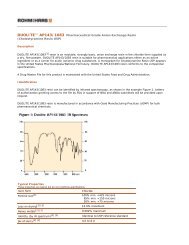ALI SHAH, PH.D. - The Dow Chemical Company
ALI SHAH, PH.D. - The Dow Chemical Company
ALI SHAH, PH.D. - The Dow Chemical Company
You also want an ePaper? Increase the reach of your titles
YUMPU automatically turns print PDFs into web optimized ePapers that Google loves.
in the details<br />
Improving safety and productivity of metal<br />
cleaning and degreasing operations<br />
Closed-Loop Solvent<br />
Handling System<br />
Ali ShAh, Ph.D.<br />
Degreasing is an essential part of modern production<br />
processes, particularly in industries that fabricate or<br />
assemble metal parts, such as aircraft, appliances,<br />
automotive, electronics and railroad. It is widely used<br />
to remove oils and oil-borne soils such as chips, metal<br />
fines and fluxes, from objects that have been stamped,<br />
machined, welded, soldered, molded or die-cast. If those<br />
products require coating or other finishing, the finish cannot<br />
be applied until the surface is acceptably free of contamination.<br />
But thorough cleaning may also be essential for proper assembly<br />
or use of unfinished parts as well.<br />
In most cases, cleaning with chlorinated solvents – including<br />
methylene chloride, perchloroethylene and trichloroethylene<br />
– is more effective than cleaning processes that use aqueous,<br />
hydrocarbon or fluorocarbon solvents, particularly for oils or<br />
greases. However, metal fabrication or assembly plants may<br />
pursue use of these alternative solvent chemistries to mitigate<br />
the potential risks of handling and using chlorinated solvents.<br />
<strong>The</strong> Safecare system from Safechem, a wholly owned<br />
subsidiary of <strong>The</strong> <strong>Dow</strong> <strong>Chemical</strong> <strong>Company</strong>, is a closed-loop<br />
solvent handling solution designed to reduce the risk of solvent<br />
handling in industrial metal cleaning and degreasing operations.<br />
Available under the Safe-Tainer brand and used successfully in<br />
Europe for almost 20 years, the Safecare system is now available<br />
in the U.S. and Canada.<br />
Improving Solvent Safety<br />
<strong>The</strong> Safecare system allows operators to take advantage of the<br />
high-performance cleaning of chlorinated solvents while limiting<br />
worker exposure and the potential of spills or emissions into the<br />
environment. <strong>The</strong> system is designed to be used in combination<br />
with closed cleaning equipment, closing the solvent supply and<br />
recovery loop. Safechem offers chlorinated solvents supplied by<br />
<strong>Dow</strong> in conjunction with the system.<br />
Like many chemicals used by industry, chlorinated solvents<br />
can pose a risk if not properly managed, but their use by<br />
industry for some 50 years has resulted in a broad knowledge<br />
base that allows for their safe use and handling. For example,<br />
as a supplier of the solvents, <strong>Dow</strong> has published a “Chlorinated<br />
Reprinted From: PROCESS CLEANING Magazine<br />
Now available in the U.S., this closed-loop solvent handling<br />
solution is designed to reduce the risk of solvent handling in<br />
industrial metal cleaning and degreasing operations.<br />
One container holds fresh solvent and one holds used solvent.<br />
Each container is delivered with a standard drum inside. <strong>The</strong><br />
steel container protects the drum, preventing damage or spills.<br />
Leak-free, dry-break couplings prevent spills and vapor emissions<br />
during solvent transfer to the cleaning system.<br />
Solvents Product Stewardship” manual and also offers material<br />
safety data sheets (MSDS) to thoroughly educate users. <strong>The</strong><br />
Safecare system goes a step beyond this essential education to<br />
provide solvent users with a closed-loop solvent delivery and
Cleaning Precision Worthy of Swiss Craftsmanship<br />
<strong>The</strong> value of the Safecare system has been demonstrated by a wide range of<br />
users over the past two decades. One such customer is Victorinox, producer of<br />
the popular Swiss Army knives and other accessories.<br />
<strong>The</strong> process of cleaning metal parts is critical for Victorinox. With a variety of<br />
precision tools and features built into the company’s product, part tolerances<br />
are precise and high quality finishing is essential. <strong>The</strong> electroplating process<br />
used to produce the chrome finish on the company’s knives requires very clean<br />
surfaces because even small amounts of oil or dirt can keep the coating from<br />
adhering properly to produce a uniform, blemish-free surface.<br />
By using chlorinated solvents, Victorinox takes advantage of highly effective<br />
and efficient cleaning capabilities. Not only do surfaces meet the company’s<br />
high standards for cleanliness, but the solvents remove grease and other<br />
contaminants more quickly than alternative materials to help maintain high<br />
levels of productivity.<br />
In addition to the closed-loop solvent handling system, Victorinox also takes<br />
advantage of a wide range of supporting service elements available to system<br />
users. Included are solvent quality testing, stabilizers and additives, waste<br />
analysis and other technical support. This level of expertise is expected by<br />
companies like Victorinox whose brands are associated with precision and<br />
quality.<br />
Victorinox began using the system in its Swiss production operations in 1994,<br />
utilizing Neu-Tri trichloroethylene from <strong>Dow</strong> in the system. Since that time, every<br />
tool on every Swiss Army Knife made by Victorinox has been cleaned using the<br />
closed-loop equipment and supporting services.<br />
recovery solution that, in combination with closed cleaning<br />
equipment, helps them implement the best available solvent<br />
handling technology (BAT) in their workplace.<br />
Virgin solvent is delivered to the customer in special doublewalled<br />
and sealed containers. New solvent is transferred to<br />
cleaning equipment using special couplings, adapters, and other<br />
measures to virtually eliminate the risk of spills or emissions.<br />
Used solvent is transferred to equally secure recycling containers<br />
using similar safeguards. <strong>The</strong> containers are designed to<br />
meet road, rail and sea transport regulations, and solvent delivery<br />
and pick-up is handled by qualified chemical distribution<br />
and waste management firms in partnership with Safechem.<br />
Responsible Use of Solvents<br />
<strong>The</strong> availability of the system in North America enables<br />
metal fabricating and assembly operations to take advantage<br />
of the highly effective and productive cleaning capabilities of<br />
chlorinated solvents instead of compromising cleaning performance<br />
by using a less effective chemical technology. Although<br />
the system is specifically designed as a vehicle for supplying<br />
chlorinated solvents produced by <strong>Dow</strong>, industrial hygiene and<br />
regulatory compliance measures are an important part of any<br />
metal cleaning and degreasing operation.<br />
<strong>The</strong> solvents may pose a workplace or<br />
environmental risk, and their use may be<br />
subject to regulation. When combined with<br />
grease and other contaminant soils after<br />
use, the waste solvent may pose an even<br />
greater concern. Once contaminated with<br />
grease and oil, even water represents a waste<br />
management issue.<br />
<strong>The</strong> Safecare system is an extension of the<br />
company’s commitment to the principles<br />
of Responsible Care, which is the chemical<br />
industry’s global voluntary initiative under<br />
which companies work together to continuously<br />
improve their health, safety and<br />
environmental performance and communicate<br />
with customers and other stakeholders<br />
about their products and processes.<br />
<strong>Dow</strong> is also a partner in Chemaware, a<br />
knowledge platform that provides knowhow<br />
and raises awareness on the safe and<br />
sustainable use of surface cleaning chemicals.<br />
<strong>The</strong> platform helps customers remain<br />
aware of changing industry requirements<br />
while sharing best practices for high quality<br />
industrial cleaning.<br />
<strong>The</strong> Safecare system and the package of<br />
service and support that surrounds it are intended to address<br />
the total cleaning needs of metal cleaning and degreasing operations.<br />
Those needs include achieving surface cleaning as efficiently<br />
and cost-effectively as possible as well as managing the<br />
safe and responsible use of essential solvent cleaning chemicals<br />
to mitigate environmental health and safety risk and manage<br />
the overall cost of regulatory compliance. PC<br />
Ali ShAh, Ph.D. is business development leader at Safechem<br />
North America, a subsidiary of <strong>The</strong> <strong>Dow</strong> <strong>Chemical</strong> <strong>Company</strong> that<br />
offers a variety of services for both chlorinated and non-chlorinated<br />
solvents. Learn more by calling 877-376-8343 or visiting<br />
dowsafechem.com.<br />
ChooSing A new CleAning ProDuCt<br />
.com<br />
BASeD on environmentAl, heAlth AnD<br />
SAfety iSSueS<br />
Performance is not the only selection criterion that needs<br />
to be addressed when looking for a new cleaning product.<br />
Read about five environmental indicators that determine a<br />
product’s overall risk.<br />
short.processcleaning.com/dguit8st<br />
Reprinted from the Sept/Oct 2010 PROCESS CLEANING Magazine and Copyright © 2010 by Gardner Publications, Inc.,<br />
6915 Valley Ave., Cincinnati, Ohio 45244-3029. Form No. 773-01019-1010 AMS


